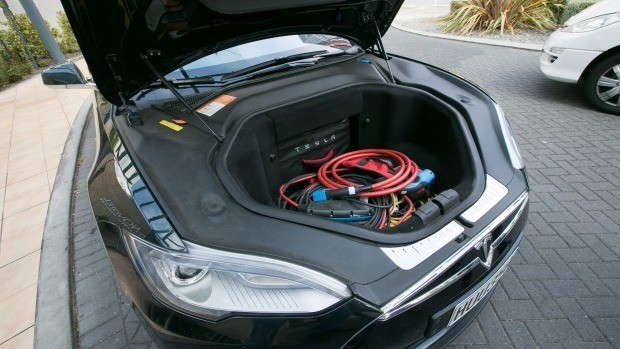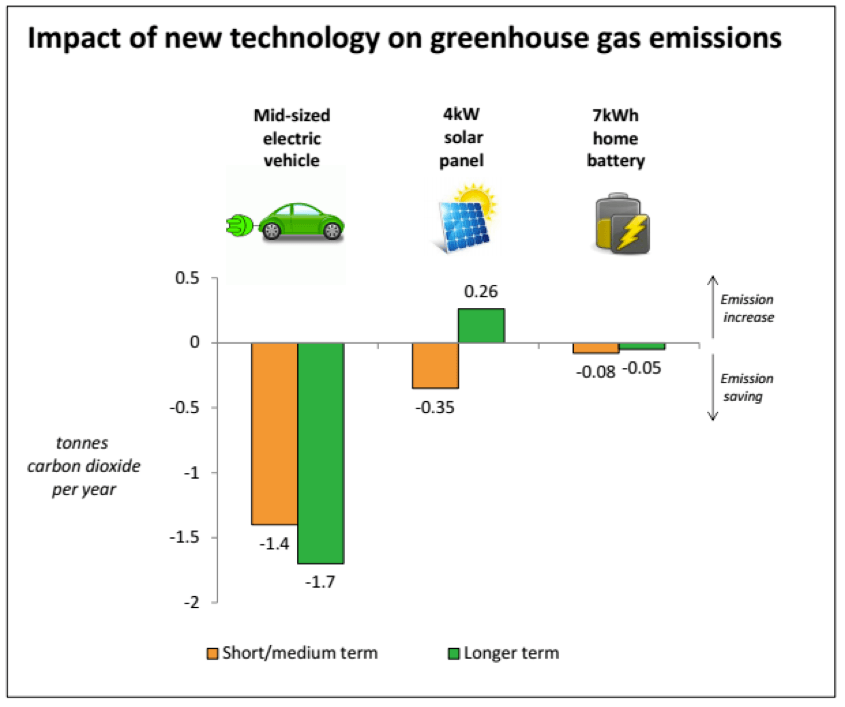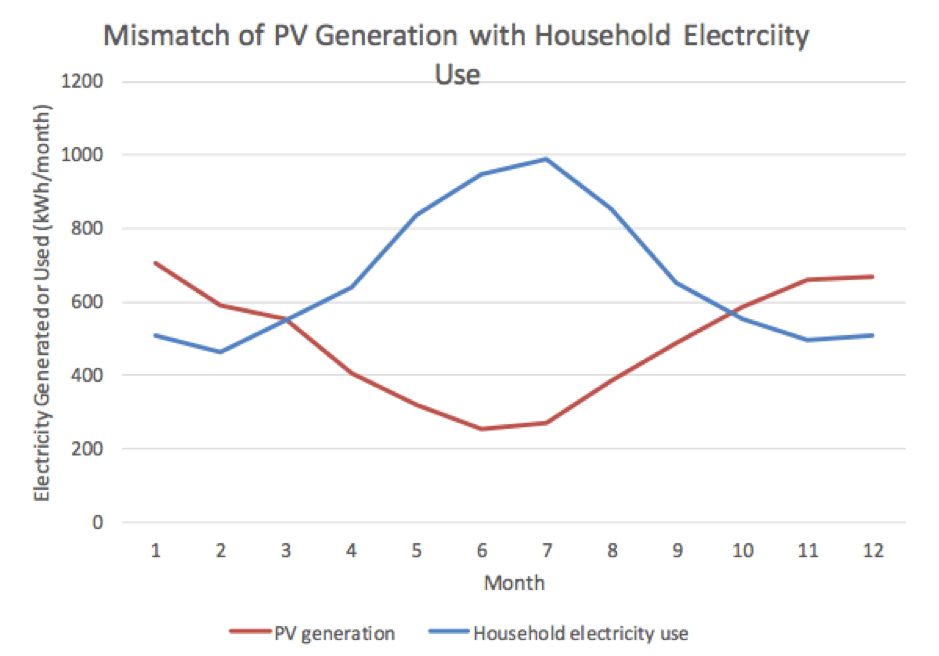People love solar power, and it’s easy to see why. The idea of generating free, clean power from your roof – and giving the finger to the power companies – is obviously appealing. But will installing solar actually help reduce CO2 emissions, and if so, how much? A new report released on Tuesday says the answer is not what you might think.
The study by Concept Consulting looked not only at solar photovoltaics (PV) but also at electric vehicles (EVs) and household battery storage systems, and the effect that uptake of these would have on CO2 emissions. It’s the first study to really look in detail at the full emissions impacts from a system-wide perspective. Here are our five key points.
1. EVs win hands-down at reducing emissions
This one is fairly intuitive when you consider that most of NZ’s electricity is already renewable, while your car is running on 100% fossil fuel (and EVs are also far more efficient than combustion engines). In terms of bang for your buck at reducing emissions, EVs outperform solar PV or batteries by far in the NZ context. The graph below shows the average emissions reductions per year achieved from a roughly similar investment ($12,000-$14,000) in the three technologies. Yes, EVs are a lot more expensive than that, but that is the average price difference between an EV and a similar conventional car.
Note that the analysis has included the ‘embodied emissions’ caused in the manufacture of the product (a common critique). These would occur outside of NZ so wouldn’t effect our national emissions, but it’s a very good thing to consider as a consumer.
2. EVs will get better over time, solar will get worse
Like a good red wine, EVs will get even better with age. This is easy to understand in simple terms – because wind and geothermal are generally the cheapest options for new build in NZ, our electricity grid will get cleaner over time, so EVs will deliver even greater emissions reductions.
To get a bit more complex, EV uptake will change the shape of the electricity demand curve and make it less “peaky” – particularly if “smart charging” techniques are adopted so that most of the charging happens overnight. This flatter demand profile would shift the economics of generation options in favour of wind and geothermal and reduce the need for coal and gas peaking stations, helping reduce emissions further over time.
When it comes to solar, the key question is what electricity source is it displacing? In the short-term (the next 5 or so years) solar will be displacing existing fossil generation, as our electricity system currently has a bit of surplus capacity. But beyond that, the report predicts that solar uptake would displace new renewable generation (mainly wind and geothermal) that would have otherwise been built. So relative to the counterfactual, solar installed today will deliver some emissions reductions in the short-term, but these will disappear over time.
But you might have noticed that the graph above says that PV installed in the longer-term will actually increase emissions. How can that be?
3. Why solar PV could help keep Huntly open
The reasoning is pretty much the reverse of the EV issue discussed above: solar uptake will exacerbate the “peakiness” of the electricity demanded from the national grid. Compared to the other renewable sources solar will displace over time (wind, geothermal and hydro), this will over time lead to greater demand for fossil fuel-powered peakers.
In NZ, people use the most power when it is cold and dark in winter, and when they get up in the morning and get home at the end of the day. The problem is that solar is very poorly matched to these demands. The seasonal mismatch is particularly important – a typical 4kW solar panel system will generate around 140% of a home’s average daily power needs in summer, but only 30% in winter.
Batteries can smooth out the daily blips, storing energy in the heat of the day to use when you get home. But you would need an enormous battery bank to carry over power from summer to winter. Even with batteries included, solar power will not help much towards our winter needs.
Our existing hydro stations will help to a greater extent – by storing more water in the summer for use in winter – but the capacity to do this is limited to relatively low uptake of solar. This is why the study’s results get worse for solar in the future as more of it is installed (it’s more a function of cumulative uptake than time). New wind farms and geothermal plants, on the other hand, don’t suffer the same winter generation problems that solar does.
So the logic goes if we have more PV we will have less wind and geothermal, which will increase the supply gaps at peak times, particularly in the winter. Over the long-term this will lead to relatively more use of gas or coal – the most economic options for meeting that seasonal demand. To illustrate the point, we are already seeing Genesis backing down on its plans to close the Huntly coal station due to concerns of a supply shortfall in a dry winter.
4. This result is because of New Zealand’s unique profile
Solar will be a big part of the solution to climate change and reducing emissions around the world, just not here in New Zealand. In Australia and many other places where electricity generation is currently reliant on coal, it makes much more sense to invest in solar rather than EVs. After all, the EV over there would end up being powered by electricity produced by burning coal. However here in New Zealand, if we want to do our bit for the climate we would be better to leave solar and stump up for an electric vehicle (if you drive a car that is).
As Parliamentary Commissioner for the Environment Jan Wright said in response to the report: “Solar makes a lot of sense in many countries, but we need to play to our strengths. Wind farms, geothermal power plants, and electric cars will help us all year round.”
5. Politicians and companies need to be honest when they talk up solar
Companies that sell solar panels need to take note of this study’s findings and be careful about how they communicate the effects on emissions. As we’ve seen, solar panels installed today will achieve some emissions reductions over their lifetime, but their impact will diminish over time. Beyond a certain level of nationwide uptake, new PV could actually become detrimental. Solar companies need to be upfront about all this and ensure their sales pitches are not misleading customers.
This applies to politicians too. When talking about tackling climate change, they need to look at the numbers and focus on what matters. We said this before in relation to Gareth Hughes’ “Fair Go for Solar” bill. Rather than getting distracted with solar policies, we should be focusing on the bigger levers for change, like increasing the carbon price and addressing our emissions from transport. We also need to think strategically about how we can best transition to a 100% renewable electricity system.
Remember that this study was looking only at the emissions impacts of these three technologies (the researchers have two more reports coming on the social and economic aspects). There are, of course, financial and other reasons why solar will make sense for some people, and the report is not disputing that.
There are also many more options people can look to cut emissions beyond just these three technologies. Solar hot water will unfortunately have the same issues as PV. But things like better household insulation, energy efficient lighting and appliances, and clean wood burners will all cut emissions in the short-term and lower the winter electricity load. And if you can ditch your car in favour of a bike and public transport, that is even better than buying an EV. Might be a bit cheaper too.



